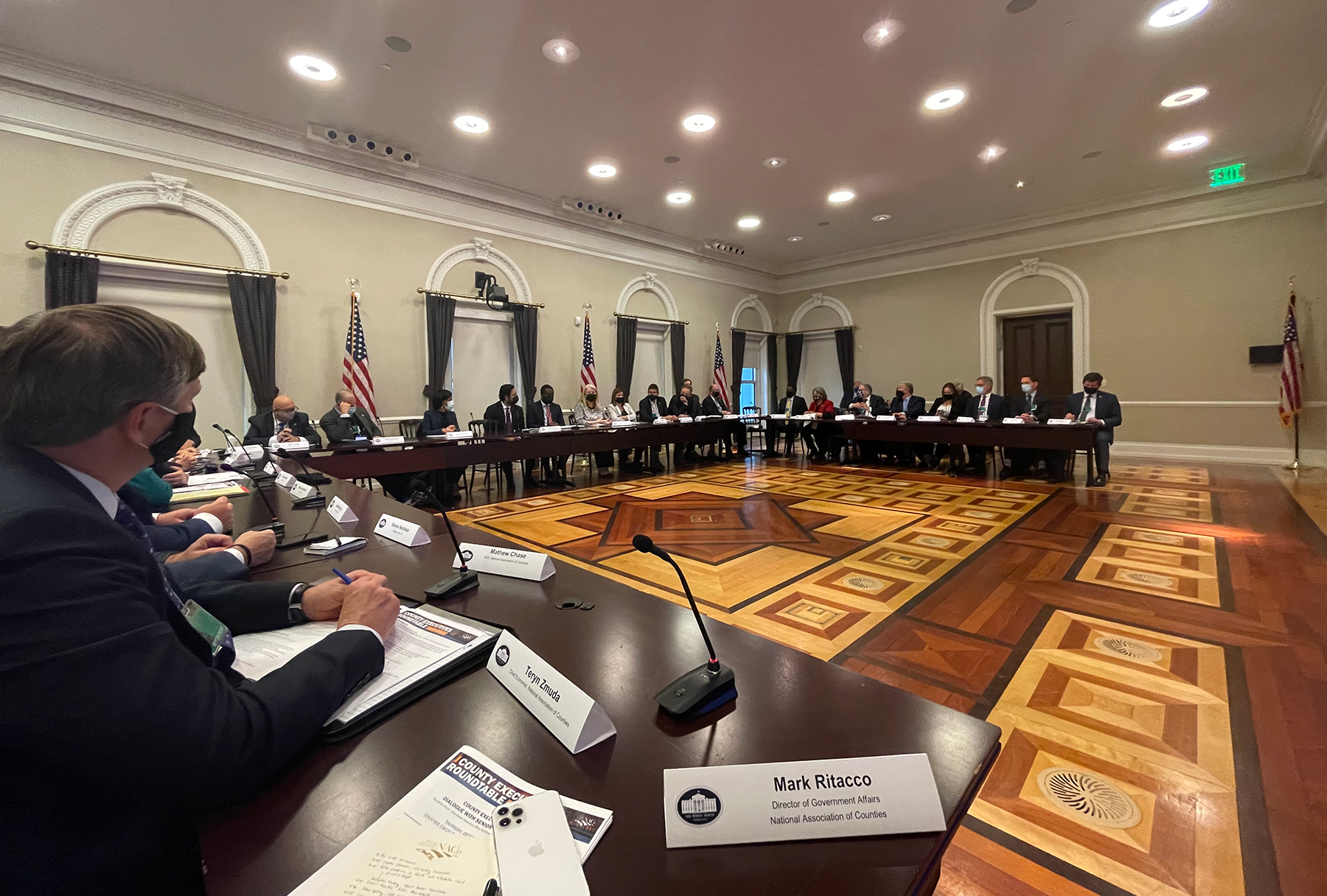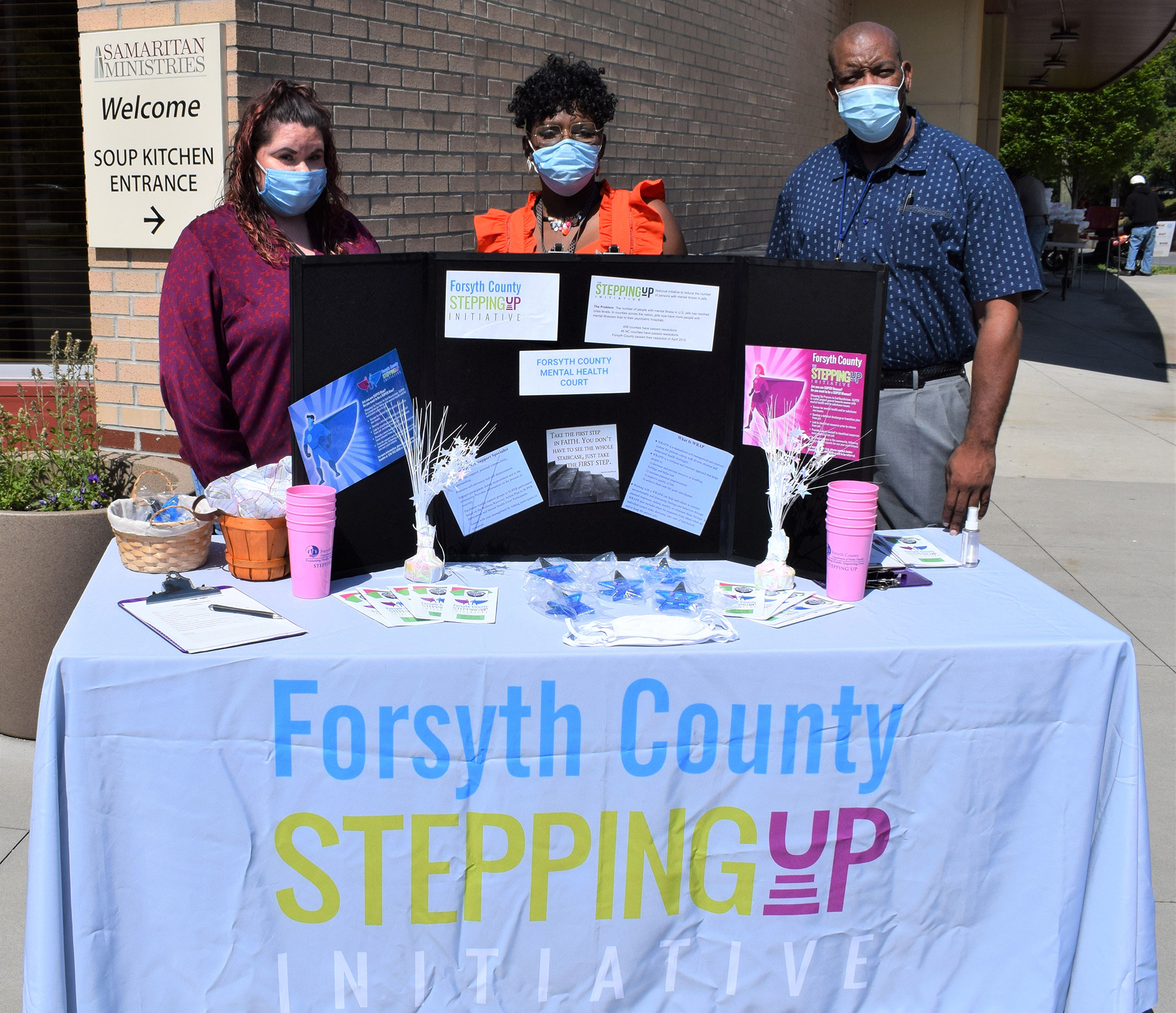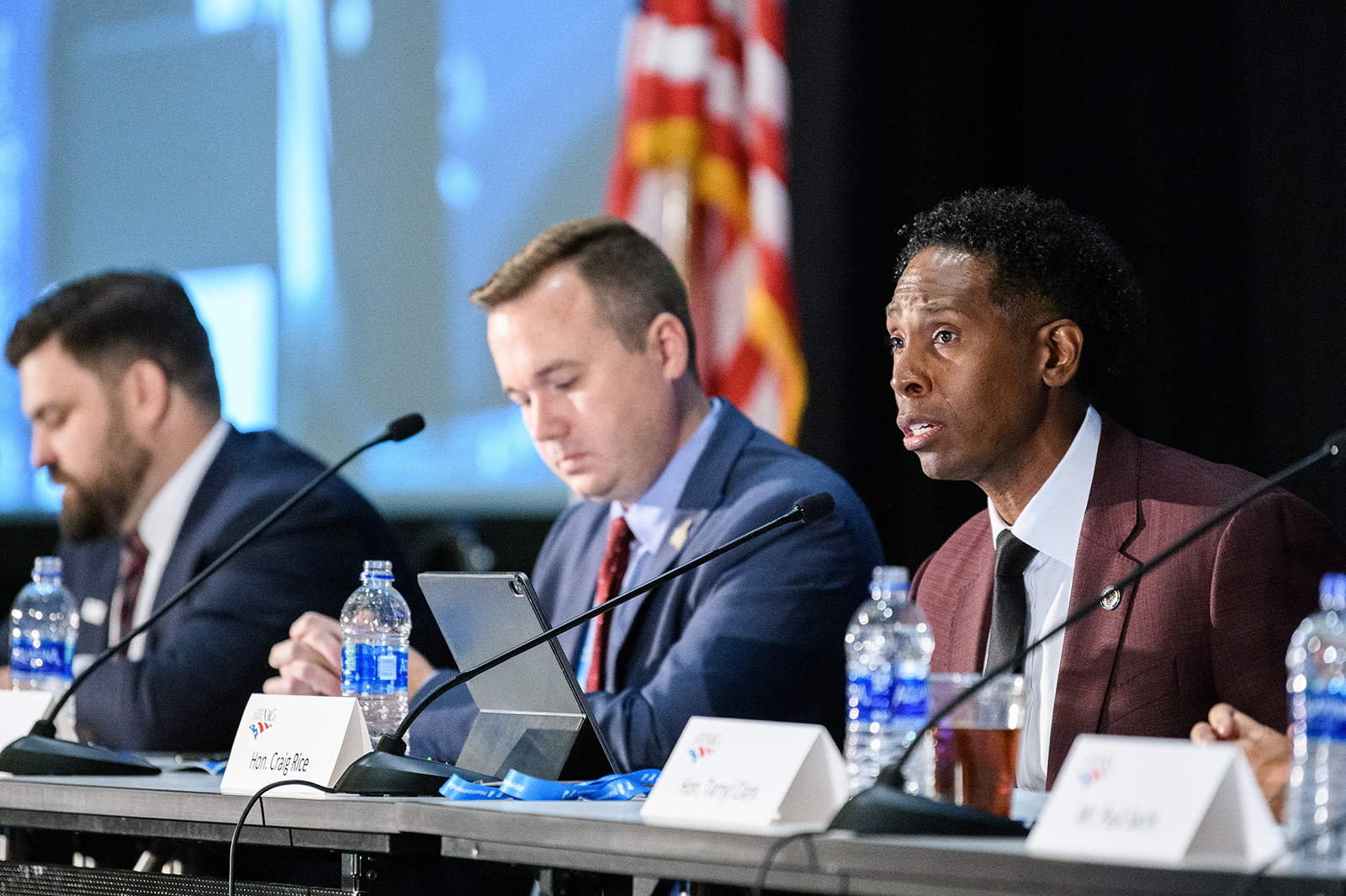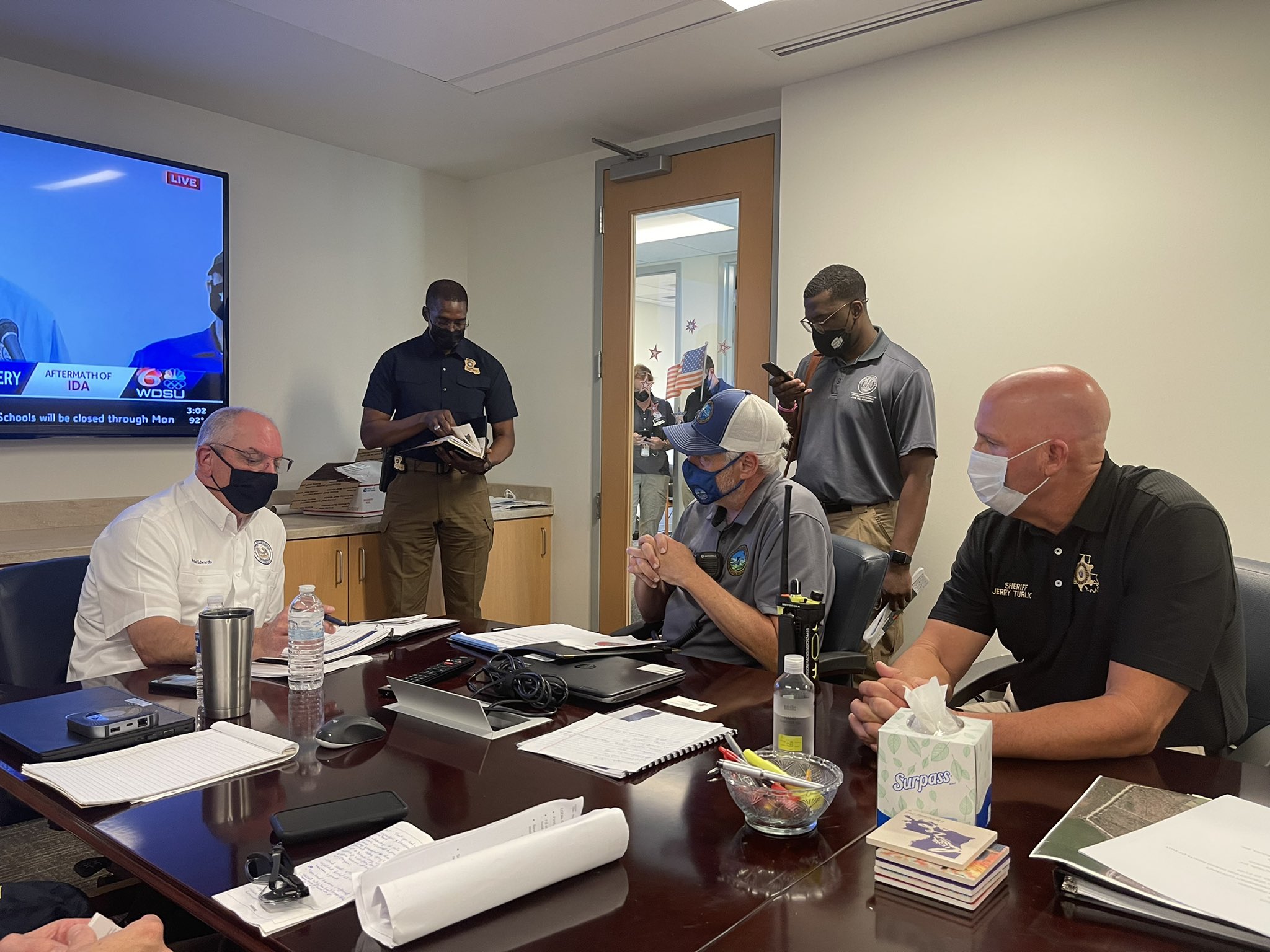2022 NACo Policy Priorities
Upcoming Events
Related News
Counties play an instrumental role in the overall public administration and governance of federal, state and local policies, programs and services.
America’s 3,069 county governments provide essential building blocks for healthy, safe and vibrant communities. Counties invest over $600 billion each year in taxpayer resources, through the leadership of nearly 40,000 county elected officials and 3.6 million county employees. Counties support and maintain key public and community infrastructure, help nurture and sustain a skilled workforce to support dynamic local economies, and promote public health and safety to protect our citizens.
NACo supports federal policies and programs that equip county governments with the resources and flexibility needed to effectively serve our residents. NACo works to preserve local decision making and protect counties from unfunded mandates and preemption of local authority. Since counties implement many federal programs at the local level and must enforce many federal regulations, NACo encourages meaningful intergovernmental consultation with counties throughout all federal policy, program and regulatory development processes.
NACo policy positions are introduced, debated and voted on by 10 policy steering committees with over 1,400 county officials, as well as NACo Board of Directors and full membership.

|
Speaker of the House Nancy Pelosi joins NACo President Larry Johnson for a conversation on COVID recovery, infrastructure and counties' indispensable public service at the 2021 NACo Annual Conference.
Restore the Balance of Federalism and Optimize Intergovernmental Partnerships
NACo supports efforts that recognize and respect the unique roles and responsibilities of counties as essential partners—not just stakeholders—in our nation’s intergovernmental system of federal, state, local and tribal government officials. Consistent and meaningful engagement and consultation between intergovernmental partners is vital in the development and implementation of effective policies, programs and regulations. Counties support the reintroduction and passage of the Restore the Partnership Act and the Unfunded Mandates Information and Transparency Act to increase transparency, reduce the regulatory burden of unfunded federal mandates on the public, foster intergovernmental dialogue and unite all levels of government in supporting our system of federalism. NACo applauds the passage of legislation such as the Infrastructure Investment and Jobs Act and the American Rescue Plan that designated funds directly to county governments and will continue to advocate for further legislation that unites all levels of government in supporting our unparalleled system of federalism.
|
At the White House, county leaders and administration officials discuss federal investments from the American Rescue Plan Act and the bipartisan infrastructure package.
Pass Legislation to Provide Additional Flexibility for the American Rescue Plan Act's Fiscal Recovery Funds to Ensure Our Nation's Preparedness and Responsivity Continues
America’s counties are on the front lines of the nation’s response to the COVID-19 pandemic, operating over 1,900 public health departments and nearly 1,000 hospitals, facilitating critical infrastructure and responsibly investing ARPA funds to support our residents and drive recovery in our communities. The Coronavirus State and Local Fiscal Recovery Fund (Recovery Fund), part of the American Rescue Plan Act (ARPA) allocated $65.1 billion in direct, flexible aid to every county, parish and borough in the country. Throughout the pandemic and recovery from it, counties have invested these funds in public health response efforts, addressed negative economic impacts, increased essential worker pay, and had the opportunity to allocate their Recovery Funds to where their community needed them most. Counties support legislation and/or regulatory changes that provides additional flexibility for Fiscal Recovery Fund investments in order for county elected officials to choose how to best utilize their funds for both local and national recovery.
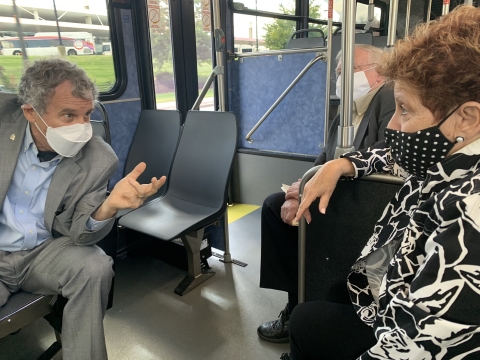
|
Summit County, Ohio Executive Ilene Shapiro and U.S. Sen. Sherrod Brown discuss county infrastructure priorities and bipartisan federal investments.
Successful Implementation and Execution of the Bipartisan Infrastructure Investments and Jobs Act for County Governments
NACo supports legislation that provides long-term, direct infrastructure investments to counties. As intergovernmental partners, federal policymakers should take action to provide meaningful and long-term investments directly to county governments to meet our many local infrastructure responsibilities.
It is critical that Congress prioritizes safety funding for roads and bridges, and flexibility for county elected officials to meet the varying needs of local communities in the Bipartisan Infrastructure Investments and Jobs Act as well as any new infrastructure bill. As public officials with significant infrastructure responsibilities, county officials support streamlining the federal permitting process to expedite the delivery of critical economic development projects and job growth.
Counties own and operate 44 PERCENT of all public roads and almost 38 PERCENT of the National Bridge Inventory and are directly involved in 40 PERCENT of all public transportation systems and 34 PERCENT of public airports
Counties also invest $134 BILLION ANNUALLY in maintaining and operating public works, including transportation, water systems, ports, dams, hospitals, schools, libraries and courthouses
|
The Forsyth County, N.C. Public Health Department's Stepping Up team promotes county programs that support residents with mental health and substance use issues.
Promote Mental Health and Substance Use Treatment and Address Essential Criminal Justice Reforms
NACo supports the advance of legislation and administrative changes that will enhance counties’ ability to provide comprehensive behavioral health services. Counties support federal funding supplications for existing mental and behavioral health services through enhancements to programs like the Community Mental Health Services block grant and the Substance Abuse Prevention and Treatment block grant. County officials support the protection of the federal-state-local partnership structure for financing and delivering Medicaid services while maximizing flexibility to support local systems of care and improving health care access. Counties oppose “off-setting” funding through the reduction or elimination of other public health programs and support protecting the Public Health Prevention Fund, the only funding stream intended to be used at the local level for the public’s health, from elimination or further cuts.
Furthermore, NACo supports prioritizing improving health outcomes for justice-involved individuals through legislative action to improve the federal, state and local partnership in providing safety-net services to pretrial incarcerated individuals that are currently denied access to federal benefits per the Medicaid Inmate Exclusion Policy (MIEP). Counties seek to also decrease mental illness in jails by fully funding the Justice and Mental Health Collaboration Program (JMHCP) in FY2022 that facilitates cross-system collaboration for individuals with mental illnesses who come into contact with the justice system.
Counties own and support 903 HOSPITALS and operate 1,943 LOCAL HEALTH DEPARTMENTS
County governments operate 91 PERCENT of local jails, serving as the front door to our criminal justice system
America's counties annually invest OVER $148 BILLION in community health systems and justice and public safety services
8.7 MILLION INDIVIDUALS cycle in and out of more than 3,000 LOCAL JAILS each year
At least 20 PERCENT of jail inmates have a serious mental illness
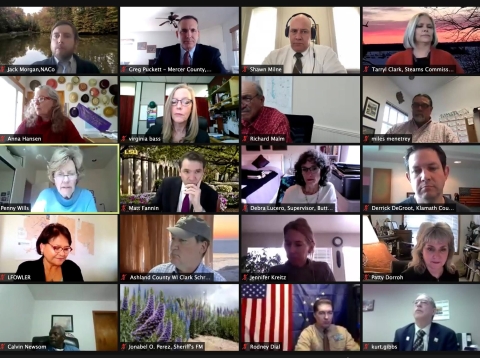
|
Members of NACo's Rural Action Caucus meet virtually during the 2021 NACo Legislative Conference to discuss key rural county priorities.
Secure the Inclusion of County Priorities in Farm Bill Reauthorization Legislation
The Farm Bill is an omnibus, multiyear law that governs an array of agricultural and food programs impacting counties, including the Supplemental Nutrition Assistance Program (SNAP) and grant funding and loan financing for water/wastewater infrastructure, community facilities, broadband, electric, telephone, housing, renewable energy and business development in rural communities. As Congress and the administration begin work to reauthorize the Farm Bill before it expires in September 2023, NACo urges Congress to prioritize rural development, including streamlining the grant and loan application process for individual Rural Development Programs under USDA while preserving program structure and funding authority. As the front line of the social safety net, counties are also responsible for administering SNAP in ten states representing 32 percent of total participants. NACo urges Congress to increase, benefit adequacy, employment and training resources and administrative flexibility within SNAP so we can better meet the needs of our vulnerable residents.
|
NACo's Broadband Task Force discusses their report highlighting significant gaps in broadband access and recommendations to address the digital divide at the 2021 NACo Annual Conference.
Boost Advanced Broadband Deployment and Accessibility While Preserving Local Decision-Making
Broadband is imperative to building resilient and future-ready communities in the 21st century. The COVID-19 pandemic has underscored the critical utility of broadband infrastructure. From the homework gap to workforce adaptations, to critical healthcare services and e-commerce – broadband is now the keystone to our nation’s response to the global health pandemic. Counties are committed to bridging the digital divide by deploying accessible and reliable high-speed internet regardless of geographical location. Counties continue to support legislation that provide direct funds for broadband deployment and adoption, broadens eligibility for deployment and provides additional federal agency grant and loan authority. Strengthening local cybersecurity systems is critical to ensure that citizen’s personal information and critical infrastructure are adequately protected, recoverable, and secured in the event of any potential breach. Furthermore, NACo strives to preserve the role of local governments as stewards of public property safety and welfare. We discourage our federal partners from undermining the intergovernmental partnership by preventing local governments from carrying out necessary regulatory processes such as historic preservation reviews, environmental reviews, and public comment periods.
In rural areas, just 65 PERCENT of residents have high-speed internet access via both fixed wireless services and mobile LTE broadband
Data collected by NACo shows 77 PERCENT of rural counties are experiencing broadband below Federal Communications Commission (FCC) standards
11.2 MILLION AMERICANS in rural areas and OVER 846,000 AMERICANS in tribal lands still lack access to broadband that meets the federal definition for minimum standards, as compared to only 3.2 MILLION AMERICANS in urban areas

|
Coconino County, Ariz. officials examine federal investments in watershed restoration with U.S. Forest Service Chief Randy Moore (center).
Support Full Funding for Payments In Lieu of Taxes (PILT) and the Secure Rural Schools (SRS) Program
Counties support maintaining long-term full funding for the Payments in Lieu of Taxes (PILT) program, which compensates public lands counties for untaxable federal land. Without predictable mandatory funding, PILT will remain a discretionary program subject to the annual appropriations process. Counties urge the administration and members of Congress to support long-term, predictable full funding for PILT in FY 2022 and beyond.
Counties also support extending the Secure Rural Schools (SRS) program as a transitional funding mechanism until the federal government fully implements a sustainable, long-term forest management program with adequate revenue sharing for forest counties and schools. NACo supports legislation such as the Secure Rural Schools Reauthorization Act of 2021 that provides forest revenue sharing payments to counties, and promotes active natural resource management. NACo will continue to urge leadership in both chambers and on both sides of the aisle to work together to enact a long-term, sustainable solution.
Furthermore, counties support the promotion of active management, restoration and resources revenue sharing on federal lands. Counties support land management legislation to address the critical land management issues on our federal lands, including increased active management of timber and rangelands, and the reduction of statutory roadblocks that impede the production of oil, gas, mineral resources, timber, renewable energy and other natural resources on federal land.
SIXTY-ONE PERCENT of counties have federal land within their boundaries, and unlike other local property owners, the federal government does not pay traditional property taxes
|
NACo Immediate Past President Gary Moore (center) and EPA Administrator Michael Regan discuss the county role in environmental stewardship and county infrastructure priorities.
Promote County Priorities and local decision-making in Future U.S. Environmental Protection Agency (EPA) and Other Federal Rulemaking
As owners and operators of public safety water conveyances, stormwater municipal separate sewer systems (MS4), green infrastructure construction and maintenance projects, water reuse and infrastructure, and emergency management readiness, the final definition of the Waters of the United States (WOTUS) rule has a direct impact on counties. Counties urge the EPA and U.S. Army Corps of Engineers to rewrite the WOTUS rule in a way that appreciates counties’ role as owners and operators of key public safety and water infrastructure, and as an intergovernmental partner in implementing federal regulations under the Clean Water Act. Furthermore, counties support efforts by the EPA and other federal agencies to study health and environmental impacts of Per-and Polyfluoroalkyl Substances (PFAS) compounds and urges the administration to work closely with state and local governments throughout the rule-making process.
On average, about TWO-THIRDS of public spending for capital investment in water infrastructure since the 1980s has been made by state and local governments
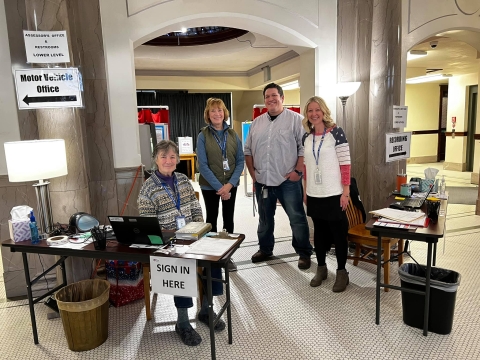
|
Montrose County, Colo. election workers welcome voters on Election Day 2021.
Maintain Election Integrity and Strengthen Election Safety
In the United States, the nation’s 3,069 counties traditionally administer and fund elections at the local level, including overseeing polling places and coordinating poll workers for federal, state and local elections. County election officials work diligently with federal, state and other local election officials to ensure the safety and security of our voting systems. County election officials strive to administer elections in a way that is accurate, safe, secure and accessible for all voters. Counties oppose legislation that imposes impractical requirements on the election process that adversely affect the conduct of state and local elections. Additionally, counties support legislation requiring federal entities to work with local governments to increase cybersecurity in elections and allocates funding directly to counties. Furthermore, counties oppose any new unfunded mandates and federal initiatives that fail to protect county revenues.
More than 191 MILLION PEOPLE were registered to vote in the 2020 general election within jurisdictions where counties play a major role in administering and coordinating elections
Between the 2016 and 2018 general elections, county jurisdictions processed OVER 73 MILLION registration forms
In 2018, counties oversaw MORE THAN 151,000 POLLING PLACES and organized OVER 593,000 POLL WORKERS
|
Plaquemines Parish, La. President Kirk Lepine (center) and Sheriff Jerry Turlich coordinate Hurricane Ida response efforts with Louisiana Gov. John Bel Edwards (left) and other officials.
Enhance Community Resilience Through Regional and Local Disaster Preparedness
NACo urges Congress and the administration to provide increased federal resources to counties for disaster planning, mitigation and recovery. Counties often serve as our nation’s first line of defense before and after disasters strike. While state statutes and organizational structures vary, local emergency management responsibilities are commonly vested in county governments. Counties support a long-term reauthorization and reform of the National Flood Insurance Program (NFIP) to improve affordability, mitigation assistance, flood risk mapping and program administration. The program aims to reduce the impact of flooding on private and public structures by providing affordable insurance to property owners, and by encouraging communities to adopt and enforce floodplain management regulations.
On average, OVER 800 COUNTIES PER YEAR experience a presidentially declared disaster
In 2021, the nation experienced 20 SEPARATE BILLION-DOLLAR DISASTERS which totaled approximately $145 BILLION in damages
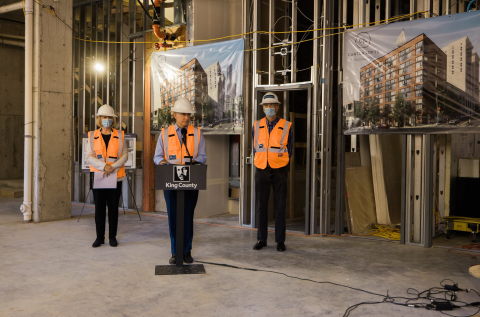
|
King County, Wash. Executive Dow Constantine announces new permanent housing sites for chronically homeless individuals.
Promote Workforce Opportunities and Supportive Services for County Residents to Support Economic Recovery
NACo supports federal investments and policies that help combat intergenerational poverty and advance and leverage both regional and local strategies for developing a competitive and quality workforce. Counties support increased funding for the Community Development Block Grant Program (CBGD), which assists urban, suburban and rural communities in improving housing and living conditions and expanding economic opportunities for low- and moderate-income persons. CDBG helps create jobs by expanding and retaining businesses and is an essential tool for helping local governments tackle serious challenges facing our communities. Counties also support reauthorization legislation of the Workforce Innovation and Opportunity Act (WIOA) that preserves local governance authority, while promoting innovation and flexibility to respond to local emerging economic realities and business needs. As the front line of the social safety net, counties urge Congress to provide increased resources and administrative flexibility for federal human services programs that help us meet the needs of vulnerable residents, including legislation authorizing flexible funding for local pilot programs that take a two-generation approach to poverty reduction.
NEARLY THREE QUARTERS OF COUNTIES have poverty rates exceeding the national average
Counties employ 3.6 MILLION RESIDENTS and provide services to 320 MILLION COUNTY RESIDENTS
- About NACo,
- Intergovernmental Affairs,
- Agriculture,
- Community & Economic Development,
- Environment, Energy & Land Use,
- Health,
- Human Services,
- Justice & Public Safety,
- Education & Workforce Development,
- Public Lands,
- Rural Counties,
- Urban Counties,
- Tax & Finance,
- Telecommunications & Technology,
- Transportation & Infrastructure
